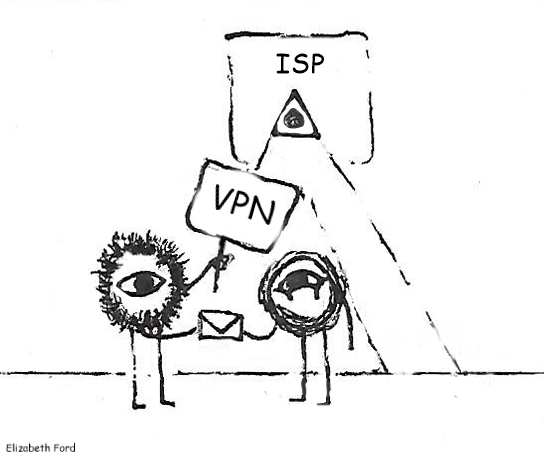Note: this is not meant to act as a buyer’s guide.
If you’ve been on Youtube in the past couple of years, you might have noticed an uptick in sponsorships from VPNs, making all sorts of claims. But what does a VPN do?
Location Services
Sometimes content published online is kept exclusive to certain countries. Canada, for example, has a rule that a certain percentage of their entertainment has to be made by Canadian artists, and Germany’s copyright laws are notoriously strict. VPNs can allow people to access this content as though they were from where it was made, instead of where they are actually at. American music videos and uncut Hulu channels for everyone!
Privacy
VPNs are usually advertised for privacy purposes. And most work pretty well! Instead of sending the information straight through to the ISP, the VPN anonymizes the data to get it to the server. From that server, your request goes through to the content you wanted, and the content comes to you anonymized. The ISP, which is usually responsible for restricting content, can’t see this data and therefore can’t restrict it. For privacy concerns around the ISP, that anonymizing is great.
It doesn’t stop there, either: If the VPN is encrypting the data coming to and from a coffee shop’s WiFi for your computer, it’s hiding it from anyone who has access to that network – which might be more than the ISP. If all it takes is the password on the receipt to get into the network, then in theory almost anyone who finds a receipt or buys a drink can access the network. This could become a problem if that person knows more about WiFi than the owners of the shop do.
But Branding?
How is it possible for there to be so many? Don’t they all do the same thing? Kinda. That’s also why ads for VPNs have been so incredibly choking. The barrier to entry to sell one as a service is actually pretty low. Depending on where the host buys their server space, they’re also low maintenance. Given those two conditions, the only thing that could keep someone from making money off of one is their visibility. The market’s flooded, so right now the winner of the race is the one with the most advertising dollars.
Does it do Everything?
For advertising concerns, a VPN is not the be-all end-all of privacy. There are so many devices in the average house (your phone, your WiFi enabled washer, your computer, your Smart TV, your gaming console…) that advertisers will still have an idea of who you are, which doesn’t even include things like cookies. When you’re using Google, every Google service knows what you’re interested in, unless you’re signed out and incognito – so searches you made could be used to tweak the content that appears on your Youtube’s ‘recommended’ page. Google allows you to turn off ad customization – that doesn’t mean they aren’t keeping the info.
Accounts
If you have an account with, say, Amazon, they already know what you’re looking at on their site because it’s linked to the account. Or if you have a digital assistant that you regularly search or browse with, the VPN can’t help you. If you’re really interested in browsing privacy and not accessing Geo-locked content, you could download something like DuckDuckGo or Ecosia (this is not a buyer’s guide, products only used as examples). These services don’t store data on your search habits. Privacy-focused search engines aren’t foolproof, but if your main concern is privacy from advertisers and you don’t want to spend money on a subscription…
Where’s The Data?
There are also concerns about the many different VPNs themselves: you are partially anonymous to your ISP (they still know you’re using them, and for approximately how much data) but you are not anonymous to the VPN. In some cases, the website on the other end expects non-encrypted data, which means that the VPN literally cannot connect you without un-encrypting that data. To be fair, most browsers will warn you about unencrypted websites. But if you insist because you think the VPN’s keeping you safe, this is important information to know. Besides that, the VPN itself can sell your data. Or get hacked! The barrier to entry is very low, which is why this is a problem!
Long story short, when Youtubers are trying to sell this service, they don’t tell you why you might not need it. It’s not a good idea to connect to public WiFi without some sort of protection. VPNs can help. VPNs are a good service if you really want to watch the UK version of The Office. However, VPNs are not an invincible shield, and they’re not always capable of end-to-end encryption. They’re a security tool, not a comprehensive solution to your privacy woes.
As always, do your research on the brands you’re considering before jumping into it headfirst.
Remember, this is an overview of VPNs as a service, not a buyer’s guide!
Sources: https://www.pcmag.com/news/what-is-a-vpn-and-why-you-need-one
https://en.wikipedia.org/wiki/Virtual_private_network (Wikipedia here serves as a full explanation of what they are without the potential bias of money)
https://geekdad.com/2020/01/why-you-probably-dont-need-a-vpn/


